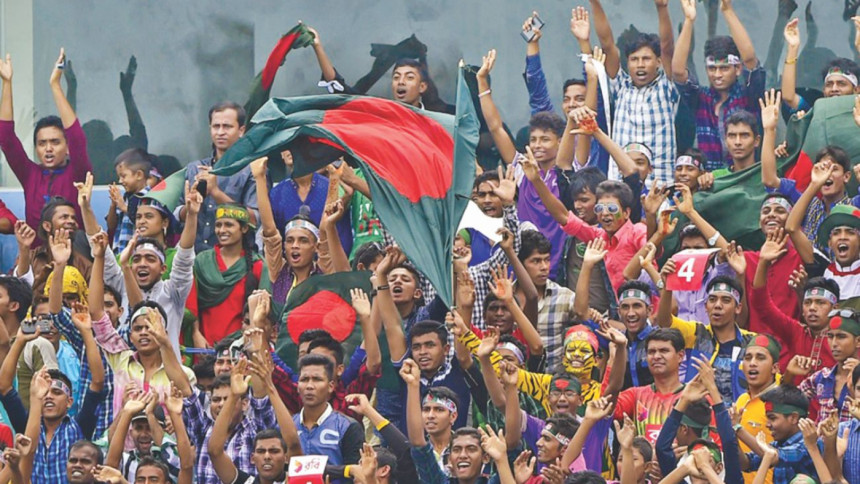Perplexing choice about security

The postponement of the Australian national cricket team's tour to Bangladesh has dealt a blow to the Bangladesh Cricket Board (BCB) and the security apparatus of the Government of Bangladesh. Apparently, all the assurances and proposed security arrangements of the BCB and security agencies in Bangladesh could not persuade Cricket Australia (CA) regarding the safety of the Australian cricketers. If we take note of the political situation, which often escalates security concerns in this country, things have been distinctly quiet in the recent past. The International Cricket Council World Twenty20, a much more important sporting event than CA's tour, took place from March to April 2014 in the country, following a national parliamentary election in Bangladesh which was anything but peaceful. Clearly, concerns about security in Bangladesh was much more intense at that time than it is now. The postponement of the Australian team's tour has also dealt a severe blow to the millions of cricket enthusiasts of this country who are among the keenest of cricket fans in the world.
However, in my view, the unfortunate postponement has raised some very critical questions about the global threat of terrorism and the perception of security which permeates well beyond the security situation in Bangladesh. The way the threat of terrorism has mushroomed across the globe has made it almost impossible to determine which would be the next place that terrorists would target. In fact, there is hardly any part of the globe that can claim to be immune from the threat of deadly terrorist attacks.
Generally, economically backward states have been perceived to be in disproportionately greater danger of imminent terrorist attacks. Given the lack of resources, and problems with governance and administration, such a perception is hardly surprising. However, if we take note of the major terror incidents in the recent past, we may surprisingly find that often economically advanced countries with sophisticated technologies and advanced security intelligence systems at their disposal, have been hit by very brutal terror attacks.
The USA, which is economically and strategically the most advanced country at the moment, has been tormented and traumatised by the unprecedented attack of September 2011. One of USA's closest allies, the United Kingdom, has suffered a string of lethal attacks in its London's Metrorail network in July 2005. In November 2008, following a terror attack in Mumbai, that took the lives of many innocent civilians, the touring English national cricket team went back to their own country but they returned to play against India within a couple of weeks. It was not just the sublime century of Sachin Tendulkar, but the gesture of the English team which was appreciated by Indian cricket enthusiasts. If we go back to the 20th century, we would find that in 1972, a terrorist attack in Munich Olympic village killed several athletes. A terrorist in a Sydney Café last year held innocent customers hostage and many lives were lost in the events following the siege. However, this had no bearing on the New Year test match between Australia and India on the Sydney Cricket Ground just a few weeks following the incident, nor did it have any visible impact on any of the World Cup matches held in Sydney or other cricket grounds in Australia, from February to March 2015. In fact, none of these above mentioned attacks has made any of these countries or their respective cities to be considered as unsafe to host major sporting events, sometimes even in the immediate aftermath of the terrorist attacks.
Clearly, whether or not a country would send its sportsmen to another country is a choice to be made by the sports administrators on the basis of assessments made by the security apparatus of the respective government. And that choice would be made on the basis of secret data only accessible to the officials. We, the public, have nothing to do with such information or the choice made based on them. And all nations would naturally tend to be protective of its leading athletes. However, seemingly inconsistent choices or decisions made on seemingly fragile or remote threats would naturally lead to a sense of confusion amidst ordinary people who are bound to feel snubbed.
Even if the security tip-offs had been the same, it is quite improbable that CA could dare to react to India in the way they have reacted to Bangladesh. So, it would clearly seem that a country being economically poor would be deemed to be inherently unreliable as a safe host, even if there is no demonstrated basis for drawing such a conclusion. Another problem with 'over-sensitivity' regarding security issues is that any over-sensitive reaction about not so distinct threats probably plays into the hands of the terrorists who want to create a division among the human race, the members of whom are created alike by nature.
The writer is an Associate Professor at School of Law, BRAC University.


 For all latest news, follow The Daily Star's Google News channel.
For all latest news, follow The Daily Star's Google News channel. 



Comments